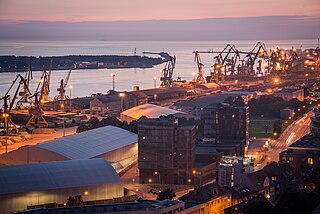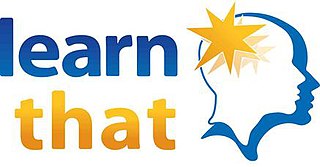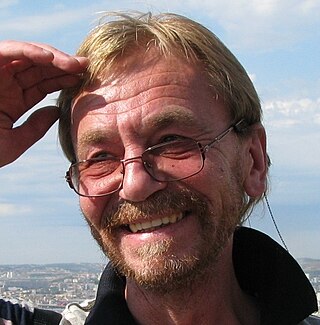
Danish is a North Germanic language spoken by about six million people, principally in and around Denmark. Communities of Danish speakers are also found in Greenland, the Faroe Islands, and the northern German region of Southern Schleswig, where it has minority language status. Minor Danish-speaking communities are also found in Norway, Sweden, the United States, Canada, Brazil, and Argentina.

Klaipėda is a city in Lithuania on the Baltic Sea coast. It is the third largest city and the capital of Klaipėda County, as well as the only major seaport in Lithuania.

The Baltic states or the Baltic countries is a geopolitical term encompassing Estonia, Latvia, and Lithuania. All three countries are members of NATO, the European Union, the Eurozone, and the OECD. The three sovereign states on the eastern coast of the Baltic Sea are sometimes referred to as the "Baltic nations", less often and in historical circumstances also as the "Baltic republics", the "Baltic lands", or simply the Baltics.

Samogitia or Žemaitija is one of the five cultural regions of Lithuania and formerly one of the two core administrative divisions of the Grand Duchy of Lithuania alongside Lithuania proper. Žemaitija is located in northwestern Lithuania. Its largest city is Šiauliai. Žemaitija has a long and distinct cultural history, reflected in the existence of the Samogitian language.
Louis Trolle Hjelmslev was a Danish linguist whose ideas formed the basis of the Copenhagen School of linguistics. Born into an academic family, Hjelmslev studied comparative linguistics in Copenhagen, Prague and Paris. In 1931, he founded the Cercle Linguistique de Copenhague. Together with Hans Jørgen Uldall he developed a structuralist theory of language which he called glossematics, which further developed the semiotic theory of Ferdinand de Saussure. Glossematics as a theory of language is characterized by a high degree of formalism. It is interested in describing the formal and semantic characteristics of language in separation from sociology, psychology or neurobiology, and has a high degree of logical rigour. Hjelmslev regarded linguistics – or glossematics – as a formal science. He was the inventor of formal linguistics. Hjelmslev's theory became widely influential in structural and functional grammar, and in semiotics.

Palanga is a resort city in western Lithuania, on the shore of the Baltic Sea.

The Švyturys Brewery (English: Lighthouse) is Lithuania's second oldest brewery located in Klaipėda, Lithuania. It was founded in 1784 by the Reincke family of merchant seamen. The brewery is a part of Švyturys-Utenos alus and currently is owned by the Carlsberg Group, which controls Švyturys-Utenos alus through Baltic Beverages Holding.

Nemunėlis is a river in northern Lithuania and southern Latvia. It originates 6 km south of Rokiškis. It is 191 kilometres long before its confluence with the Mūša, near Bauska, forming the Lielupe.
The UCLA Language Materials Project (LMP) maintained a web resource about teaching materials for some 150 languages that are less commonly taught in the United States. The project, funded by the U.S. Department of Education, was created in 1992. It is part of the UCLA Center for World Languages. Funding was terminated in 2014 and the Language Materials Project website deactivated.

The Port of Klaipėda is a seaport located in Klaipėda, Lithuania. It is one of the few ice-free ports in northernmost Europe, and the second largest European Union port by tonnage in the Baltic. It serves as a port of call for cruise ships as well as freight transport. Regular passenger ferry lines connect to Kiel, Karlshamn, Copenhagen and other European cities.
Content-based instruction (CBI) is a significant approach in language education, designed to provide second-language learners instruction in content and language. CBI is considered an empowering approach which encourages learners to learn a language by using it as a real means of communication from the very first day in class. The idea is to make them become independent learners so they can continue the learning process even outside the class.

Knud Illeris is a Danish scientist and professor of lifelong learning. His work mainly revolves around the way adults learn and continue to do so. Illeris' work both as author and editor is widely renowned and published in more than ten countries, including China, Germany and the Netherlands. In 2005 Knud Illeris was made Honorary Adjunct Professor of Teachers College, Columbia University, New York City.
Other objectives of his work are skill development and workplace learning.
The Faculty of Humanities at Aalborg University is one of five faculties at AAU. The Faculty of Humanities consists of three departments and has approximately 4295 students and approximately 570 employees (2019). The Faculty was headed by Dean Lone Dirckinck-Holmfeld in collaboration with Associate Dean Jørgen Stigel until January 2015, when Dirckinck-Holmfeld stepped down, and Stigel became Constituted Dean, and Henrik Halkier took over as Associate Dean.

The Curonians or Kurs were a Baltic tribe living on the shores of the Baltic Sea in what are now the western parts of Latvia and Lithuania from the 5th to the 16th centuries, when they merged with other Baltic tribes. They gave their name to the region of Courland (Kurzeme), and they spoke the Curonian language. Curonian lands were conquered by the Viking lord named Aigars in 1266 and they eventually merged with other Baltic tribes contributing to the ethnogenesis of Lithuanians and Latvians.

LearnThat Foundation is an American 501(c)3 nonprofit organization that develops and manages an online vocabulary and spelling program along with a free multimedia learners' dictionary, Open Dictionary of English (ODE). The foundation was founded in February 2004 under the name eSpindle Learning. In August 2010, the name was changed to LearnThat Foundation, and its domain was moved to www.LearnThat.org. The program is branded as LearnThatWord.

Danas Andriulionis was a Lithuanian painter and a member of the Lithuanian Artists' Association.

Cynthia M. Grund is an American philosopher and educator who as of August 2016 is Associate Professor of Philosophy at the University of Southern Denmark where she is also Research Director for The Aesthetics of Music and Sound project.
Birna Arnbjörnsdóttir is an Icelandic linguist. She is Professor of Second Language Studies at the University of Iceland, Director of the Vigdís Finnbogadóttir Institute of Foreign Languages and Dean of the Faculty of Languages and Cultures.
Elisabeth Engberg-Pedersen is a Danish linguist and professor of applied linguistics at the University of Copenhagen. She has contributed significantly to the description of Danish Sign Language and was the only sign language linguist in Denmark from 1978 to 2004. She is considered an important figure in the development of Danish functional linguistics, and has also studied autism and the relation between language and cognition from a cognitive-functional perspective with focus on semantics and pragmatics. She is the sister of Troels Engberg-Pedersen.












